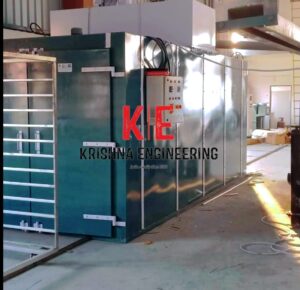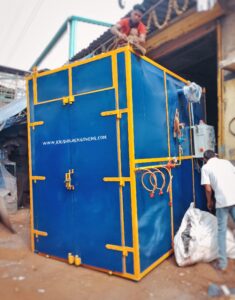What is Electrode Drying Oven ?
The electrode drying ovens are used mainly at industrial sites where they are used to heat-treat weldments or metallic parts by the welders and fabricators.
Electrode drying ovens separate moisture from the welding rods when they are not in use. The best way for you to keep welding rods dry is to store them in a thermostatically controlled electrode oven.

Electrodes must be safely stored and always be kept dry away from moisture. This is because moisture destroys the characteristics of the electrode coating. This may cause excessive splattering during welding. It can also cause weakness and cracks in the welded area.
An electrode drying oven is a specialized piece of equipment used to remove moisture or other volatile substances from electrodes, ensuring their optimal performance in various industrial applications. The drying process is crucial for electrodes that are used in welding, electroplating, electrochemical processes, or any application where the presence of moisture can negatively impact performance and quality.
Here are the key features and functions of an electrode drying oven:
Temperature control: The oven is designed to reach and maintain specific temperature ranges suitable for drying electrodes. Typically, temperatures range from 50 to 300 degrees Celsius (122 to 572 degrees Fahrenheit). Precise temperature control is essential to prevent overheating or under-drying of the electrodes.
Insulation: The oven is insulated to minimize heat loss and ensure energy efficiency during the drying process. Proper insulation helps maintain stable temperature conditions inside the oven and reduces the energy required for heating.
Heating elements: High-quality heating elements, such as electric resistance heating coils, are used to generate the required heat for drying the electrodes. These elements are designed to withstand the operating temperature range and provide uniform heating.
Air circulation: The oven incorporates an air circulation system, typically using fans or blowers, to ensure even distribution of heat throughout the oven. This helps to accelerate the drying process and prevent hot spots.
Control panel: The oven is equipped with a control panel that allows operators to set and monitor the drying temperature, time, and other parameters. Some models may offer programmable controls for automated drying cycles.
Material handling: Depending on the size and design of the oven, it may include trays, racks, or hangers to hold and support the electrodes during the drying process. This ensures proper airflow around the electrodes and facilitates easy loading and unloading.
Exhaust system: If the drying process generates any fumes or volatile gases, the oven may feature an exhaust system to vent them safely. This helps maintain a clean working environment and ensures compliance with environmental regulations.
Safety features: Electrode drying ovens may include safety features such as over-temperature protection, alarms, and safety interlocks to prevent overheating and ensure operator safety.
It’s important to note that the specific design and features of an electrode drying oven may vary depending on the manufacturer, the size and capacity of the oven, and the specific requirements of the industry or application in which it is used.
Worldwide Exports Location:
Following Countries: Afghanistan, Albania, Algeria, Andorra, Angola, Antigua And Barbuda, Argentina, Armenia, Australia, Austria, Azerbaijan, Bahamas, Bahrain, Bangladesh, Barbados, Belarus, Belgium, Belize, Benin, Bhutan, Bolivia, Bosnia And Herzegovina, Botswana, Brazil, Brunei, Bulgaria, Burkina Faso, Burundi, Cabo Verde, Cambodia, Cameroon, Canada, Central African Republic (CAR), Chad, Chile, Colombia, Comoros, Democratic Republic Of The Congo, Republic Of The Congo, Costa Rica, Cote D’Ivoire, Croatia, Cuba, Cyprus, Czech Republic, Denmark, Djibouti, Dominica, Dominican Republic, Ecuador, Egypt, El Salvador, Equatorial Guinea, Eritrea, Estonia, Ethiopia, Fiji, Finland, France, Gabon, Gambia, Georgia, Germany, Ghana, Greece, Grenada, Guatemala, Guinea, Guinea-Bissau, Guyana, Haiti, Honduras, Hungary, Iceland, India, Indonesia, Iran, Iraq, Ireland, Israel, Italy, Jamaica, Japan, Jordan, Kazakhstan, Kenya, Kiribati, Kosovo, Kuwait, Kyrgyzstan, Laos, Latvia, Lebanon, Lesotho, Liberia, Libya, Liechtenstein, Lithuania, Luxembourg, Macedonia (FYROM), Madagascar, Malawi, Malaysia, Maldives, Mali, Malta, Marshall Islands, Mauritania, Mauritius, Mexico, Micronesia, Moldova, Monaco, Mongolia, Montenegro, Morocco, Mozambique, Myanmar (Burma), Namibia, Nauru, Nepal, Netherlands, New Zealand, Nicaragua, Niger, Nigeria, North Korea, Norway, Oman, Pakistan, Palau, Palestine, Panama, Papua New Guinea, Paraguay, Peru, Philippines, Poland, Portugal, Qatar, Romania, Russia, Rwanda, Saint Kitts And Nevis, Saint Lucia, Saint Vincent And The Grenadines, Samoa, San Marino, Sao Tome And Principe, Saudi Arabia, Senegal, Serbia, Seychelles, Sierra Leone, Singapore, Slovakia, Slovenia, Solomon Islands, Somalia, South Africa, South Korea, South Sudan, Spain, Sri Lanka, Sudan, Suriname, Swaziland, Sweden, Switzerland, Syria, Taiwan, Tajikistan, Tanzania, Thailand, Timor-Leste, Togo, Tonga, Trinidad And Tobago, Tunisia, Turkey, Turkmenistan, Tuvalu, Uganda, Ukraine, United Arab Emirates (UAE), United Kingdom (UK), United States Of America (USA), Uruguay, Uzbekistan, Vanuatu, Vatican City (Holy See), Venezuela, Vietnam, Yemen, Zambia, Zimbabwe.
India Location –
Maharashtra, Mumbai, Pune, Nagpur, Nashik, Virar, Palghar, Aurangabad, Bhiwandi, Thane, Amravati, Malegaon, Kolhapur, Nanded, Sangli ,Jalgaon, Akola, Latur, Ahmadnagar, Dhule, Ichalkaranji, Chandrapur, Parbhani, Jalna, Bhusawal, Navi Mumbai, Raigad, Panvel, Bangalore, Karnataka, Ahmedabad, Gujarat, Chennai, Tamil Nadu, Surat, Coimbatore, Vadodara, Indore, Madhya Pradesh, Bhubaneswar, Orissa, Hyderabad, Andhra Pradesh, Jamshedpur, Jharkhand, Kolkata, West Bengal ,Delhi, Jaipur, Rajasthan, Kochi, Kerala, Chandigarh, Punjab, Dehradun, Uttarakhand , Lucknow, Uttar Pradesh, Visakhapatnam, Andhra Pradesh, Guwahati, Assam, Amritsar, Mangalore, Noida, Gurgaon, Haryana, Bhopal, Madhya Pradesh, Aurangabad, Faridabad, Allahabad, Prayagraj, Jodhpur.




